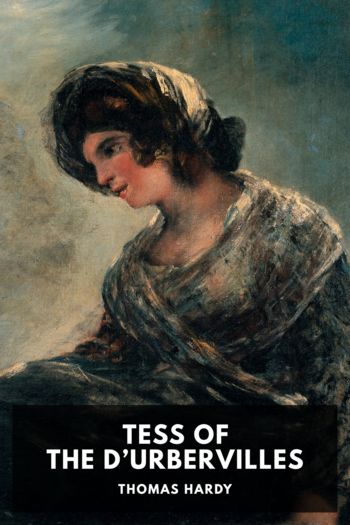Tess of the d’Urbervilles - Thomas Hardy (best color ereader .txt) 📗

- Author: Thomas Hardy
Book online «Tess of the d’Urbervilles - Thomas Hardy (best color ereader .txt) 📗». Author Thomas Hardy
The mixed, singular, luminous gloom in which they walked along together to the spot where the cows lay often made him think of the Resurrection hour. He little thought that the Magdalen might be at his side. Whilst all the landscape was in neutral shade his companion’s face, which was the focus of his eyes, rising above the mist stratum, seemed to have a sort of phosphorescence upon it. She looked ghostly, as if she were merely a soul at large. In reality her face, without appearing to do so, had caught the cold gleam of day from the northeast; his own face, though he did not think of it, wore the same aspect to her.
It was then, as has been said, that she impressed him most deeply. She was no longer the milkmaid, but a visionary essence of woman—a whole sex condensed into one typical form. He called her Artemis, Demeter, and other fanciful names half teasingly, which she did not like because she did not understand them.
“Call me Tess,” she would say askance; and he did.
Then it would grow lighter, and her features would become simply feminine; they had changed from those of a divinity who could confer bliss to those of a being who craved it.
At these nonhuman hours they could get quite close to the waterfowl. Herons came, with a great bold noise as of opening doors and shutters, out of the boughs of a plantation which they frequented at the side of the mead; or, if already on the spot, hardily maintained their standing in the water as the pair walked by, watching them by moving their heads round in a slow, horizontal, passionless wheel, like the turn of puppets by clockwork.
They could then see the faint summer fogs in layers, woolly, level, and apparently no thicker than counterpanes, spread about the meadows in detached remnants of small extent. On the gray moisture of the grass were marks where the cows had lain through the night—dark-green islands of dry herbage the size of their carcasses, in the general sea of dew. From each island proceeded a serpentine trail, by which the cow had rambled away to feed after getting up, at the end of which trail they found her; the snoring puff from her nostrils, when she recognized them, making an intenser little fog of her own amid the prevailing one. Then they drove the animals back to the barton, or sat down to milk them on the spot, as the case might require.
Or perhaps the summer fog was more general, and the meadows lay like a white sea, out of which the scattered trees rose like dangerous rocks. Birds would soar through it into the upper radiance, and hang on the wing sunning themselves, or alight on the wet rails subdividing the mead, which now shone like glass rods. Minute diamonds of moisture from the mist hung, too, upon Tess’s eyelashes, and drops upon her hair, like seed pearls. When the day grew quite strong and commonplace these dried off her; moreover, Tess then lost her strange and ethereal beauty; her teeth, lips, and eyes scintillated in the sunbeams and she was again the dazzlingly fair dairymaid only, who had to hold her own against the other women of the world.
About this time they would hear Dairyman Crick’s voice, lecturing the nonresident milkers for arriving late, and speaking sharply to old Deborah Fyander for not washing her hands.
“For Heaven’s sake, pop thy hands under the pump, Deb! Upon my soul, if the London folk only knowed of thee and thy slovenly ways, they’d swaller their milk and butter more mincing than they do a’ready; and that’s saying a good deal.”
The milking progressed, till towards the end Tess and Clare, in common with the rest, could hear the heavy breakfast table dragged out from the wall in the kitchen by Mrs. Crick, this being the invariable preliminary to each meal; the same horrible scrape accompanying its return journey when the table had been cleared.
XXIThere was a great stir in the milk-house just after breakfast. The churn revolved as usual, but the butter would not come. Whenever this happened the dairy was paralyzed. Squish, squash echoed the milk in the great cylinder, but never arose the sound they waited for.
Dairyman Crick and his wife, the milkmaids Tess, Marian, Retty Priddle, Izz Huett, and the married ones from the cottages; also Mr. Clare, Jonathan Kail, old Deborah, and the rest, stood gazing hopelessly at the churn; and the boy who kept the horse going outside put on moon-like eyes to show his sense of the situation. Even the melancholy horse himself seemed to look in at the window in inquiring despair at each walk round.
“ ’Tis years since I went to Conjuror Trendle’s son in Egdon—years!” said the dairyman bitterly. “And he was nothing to what his father had been. I have said fifty times, if I have said once, that I don’t believe in en; though ’a do cast folks’ waters very true. But I shall have to go to ’n if he’s alive. O yes, I shall have to go to ’n, if this sort of thing continnys!”
Even Mr. Clare began to feel tragical at the dairyman’s desperation.
“Conjuror Fall, t’other side of Casterbridge, that they used to call ‘Wide-O,’ was a very good man when I was a boy,” said Jonathan Kail. “But he’s rotten as touchwood by now.”
“My grandfather used to go to Conjuror Mynterne,





Comments (0)